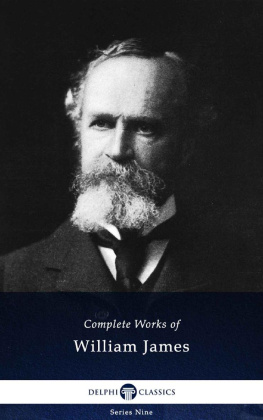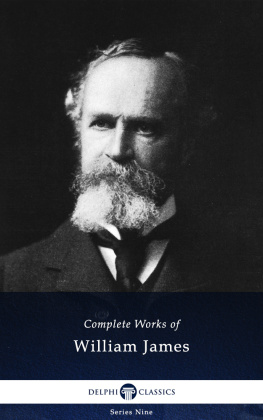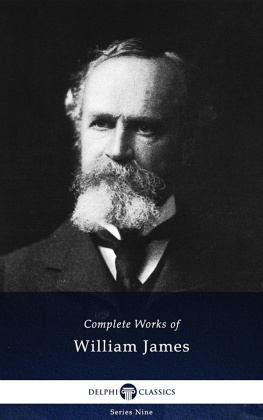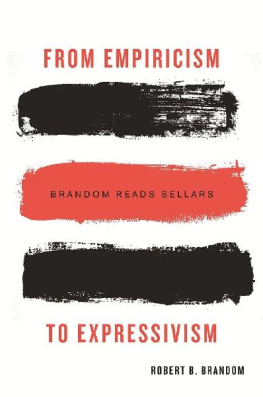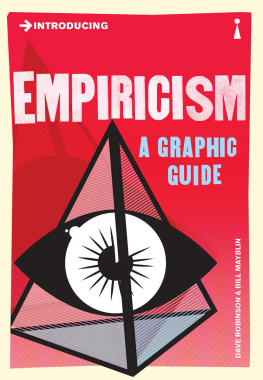James William - Essays in Radical Empiricism
Here you can read online James William - Essays in Radical Empiricism full text of the book (entire story) in english for free. Download pdf and epub, get meaning, cover and reviews about this ebook. genre: Science. Description of the work, (preface) as well as reviews are available. Best literature library LitArk.com created for fans of good reading and offers a wide selection of genres:
Romance novel
Science fiction
Adventure
Detective
Science
History
Home and family
Prose
Art
Politics
Computer
Non-fiction
Religion
Business
Children
Humor
Choose a favorite category and find really read worthwhile books. Enjoy immersion in the world of imagination, feel the emotions of the characters or learn something new for yourself, make an fascinating discovery.
- Book:Essays in Radical Empiricism
- Author:
- Genre:
- Rating:4 / 5
- Favourites:Add to favourites
- Your mark:
- 80
- 1
- 2
- 3
- 4
- 5
Essays in Radical Empiricism: summary, description and annotation
We offer to read an annotation, description, summary or preface (depends on what the author of the book "Essays in Radical Empiricism" wrote himself). If you haven't found the necessary information about the book — write in the comments, we will try to find it.
Essays in Radical Empiricism — read online for free the complete book (whole text) full work
Below is the text of the book, divided by pages. System saving the place of the last page read, allows you to conveniently read the book "Essays in Radical Empiricism" online for free, without having to search again every time where you left off. Put a bookmark, and you can go to the page where you finished reading at any time.
Font size:
Interval:
Bookmark:
This eBook is for the use of anyone anywhere at no cost and with
almost no restrictions whatsoever. You may copy it, give it away or
re-use it under the terms of the Project Gutenberg License included
with this eBook or online at www.gutenberg.org
Title: Essays in Radical Empiricism
Author: William James
Release Date: May 26, 2010 [eBook #32547]
Language: English
Character set encoding: ISO-8859-1
***START OF THE PROJECT GUTENBERG EBOOK ESSAYS IN RADICAL EMPIRICISM***
and the Project Gutenberg Online Distributed Proofreading Team
(http://www.pgdp.net)
By William James
THE VARIETIES OF RELIGIOUS EXPERIENCE: A STUDY IN
HUMAN NATURE. Gifford Lectures delivered at Edinburgh in 1901-1902.
8vo. New York, London, Bombay, and Calcutta: Longmans,
Green & Co. 1902.
PRAGMATISM: A NEW NAME FOR SOME OLD WAYS OF THINKING:
POPULAR LECTURES ON PHILOSOPHY. 8vo. New York,
London, Bombay, and Calcutta: Longmans, Green & Co. 1907.
THE MEANING OF TRUTH: A SEQUEL TO PRAGMATISM. 8vo.
New York, London, Bombay, and Calcutta: Longmans, Green & Co.
1909.
A PLURALISTIC UNIVERSE: HIBBERT LECTURES ON THE
PRESENT SITUATION IN PHILOSOPHY. 8vo. New York, London,
Bombay, and Calcutta: Longmans, Green & Co. 1909.
SOME PROBLEMS OF PHILOSOPHY: A BEGINNING OF AN INTRODUCTION
TO PHILOSOPHY. 8vo. New York, London, Bombay,
and Calcutta: Longmans, Green & Co. 1911.
ESSAYS IN RADICAL EMPIRICISM. 8vo. New York, London, Bombay,
and Calcutta: Longmans, Green & Co. 1912.
THE WILL TO BELIEVE, AND OTHER ESSAYS IN POPULAR
PHILOSOPHY. 12mo. New York, London, Bombay, and Calcutta:
Longmans, Green & Co. 1897.
MEMORIES AND STUDIES. 8vo. New York, London, Bombay, and
Calcutta: Longmans, Green & Co. 1911.
THE PRINCIPLES OF PSYCHOLOGY. 2 vols., 8vo. New York:
Henry Holt & Co. London: Macmillan & Co. 1890.
PSYCHOLOGY: BRIEFER COURSE. 12mo. New York: Henry Holt
& Co. London: Macmillan & Co. 1892.
TALKS TO TEACHERS ON PSYCHOLOGY: AND TO STUDENTS
ON SOME OF LIFES IDEALS. 12mo. New York: Henry Holt
& Co. London, Bombay, and Calcutta: Longmans, Green & Co. 1899.
HUMAN IMMORTALITY: TWO SUPPOSED OBJECTIONS TO THE
DOCTRINE. 16mo. Boston: Houghton Mifflin Co. London: Archibald
Constable & Co. 1898.
THE LITERARY REMAINS OF HENRY JAMES. Edited, with an
Introduction, by William James. With Portrait. Crown 8vo. Boston:
Houghton Mifflin Co. 1885.
RADICAL EMPIRICISM
BY

LONGMANS, GREEN, AND CO
FOURTH AVENUE & 30TH STREET, NEW YORK
LONDON, BOMBAY AND CALCUTTA
1912
COPYRIGHT, 1912, BY HENRY JAMES JR.
ALL RIGHTS RESERVED
The present volume is an attempt to carry out a plan which William James is known to have formed several years before his death. In 1907 he collected reprints in an envelope which he inscribed with the title Essays in Radical Empiricism; and he also had duplicate sets of these reprints bound, under the same title, and deposited for the use of students in the general Harvard Library, and in the Philosophical Library in Emerson Hall.
Two years later Professor James published The Meaning of Truth and A Pluralistic Universe, and inserted in these volumes several of the articles which he had intended to use in the Essays in Radical Empiricism. Whether he would nevertheless have carried out his original plan, had he lived, cannot be certainly known. Several facts, however, stand out very clearly. In the first place, the articles included in the original plan but omitted from his later volumes are indispensable to the understanding of his other writings. To these articles he repeatedly alludes. Thus, in The Meaning of Truth (p. 127), he says: This statement is probably excessively obscure to any one who has not read my two articles Does Consciousness Exist? and A World of Pure Experience. Other allusions have been indicated in the present text. In the second place, the articles originally brought together as Essays in Radical Empiricism form a connected whole. Not only were most of them written consecutively within a period of two years, but they contain numerous cross-references. In the third place, Professor James regarded radical empiricism as an independent doctrine. This he asserted expressly: Let me say that there is no logical connexion between pragmatism, as I understand it, and a doctrine which I have recently set forth as radical empiricism. The latter stands on its own feet. One may entirely reject it and still be a pragmatist. (Pragmatism, 1907, Preface, p. ix.) Finally, Professor James came toward the end of his life to regard radical empiricism as more fundamental and more important than pragmatism. In the Preface to The Meaning of Truth (1909), the author gives the following explanation of his desire to continue, and if possible conclude, the controversy over pragmatism: I am interested in another doctrine in philosophy to which I give the name of radical empiricism, and it seems to me that the establishment of the pragmatist theory of truth is a step of first-rate importance in making radical empiricism prevail (p. xii).
In preparing the present volume, the editor has therefore been governed by two motives. On the one hand, he has sought to preserve and make accessible certain important articles not to be found in Professor Jamess other books. This is true of Essays i, ii, iv, v, viii, ix, x, xi , and xii . On the other hand, he has sought to bring together in one volume a set of essays treating systematically of one independent, coherent, and fundamental doctrine. To this end it has seemed best to include three essays ( iii, vi , and vii ), which, although included in the original plan, were afterwards reprinted elsewhere; and one essay, xii , not included in the original plan. Essays iii , vi , and vii are indispensable to the consecutiveness of the series, and are so interwoven with the rest that it is necessary that the student should have them at hand for ready consultation. Essay xii throws an important light on the authors general empiricism, and forms an important link between radical empiricism and the authors other doctrines.
In short, the present volume is designed not as a collection but rather as a treatise. It is intended that another volume shall be issued which shall contain papers having biographical or historical importance which have not yet been reprinted in book form. The present volume is intended not only for students of Professor Jamess philosophy, but for students of metaphysics and the theory of knowledge. It sets forth systematically and within brief compass the doctrine of radical empiricism.
A word more may be in order concerning the general meaning of this doctrine. In the Preface to the Will to Believe (1898), Professor James gives the name radical empiricism to his philosophic attitude, and adds the following explanation: I say empiricism, because it is contented to regard its most assured conclusions concerning matters of fact as hypotheses liable to modification in the course of future experience; and I say radical, because it treats the doctrine of monism itself as an hypothesis, and, unlike so much of the halfway empiricism that is current under the name of positivism or agnosticism or scientific naturalism, it does not dogmatically affirm monism as something with which all experience has got to square (pp. vii-viii). An empiricism of this description is a philosophic attitude or temper of mind rather than a doctrine, and characterizes all of Professor Jamess writings. It is set forth in Essay xii of the present volume.
Font size:
Interval:
Bookmark:
Similar books «Essays in Radical Empiricism»
Look at similar books to Essays in Radical Empiricism. We have selected literature similar in name and meaning in the hope of providing readers with more options to find new, interesting, not yet read works.
Discussion, reviews of the book Essays in Radical Empiricism and just readers' own opinions. Leave your comments, write what you think about the work, its meaning or the main characters. Specify what exactly you liked and what you didn't like, and why you think so.







